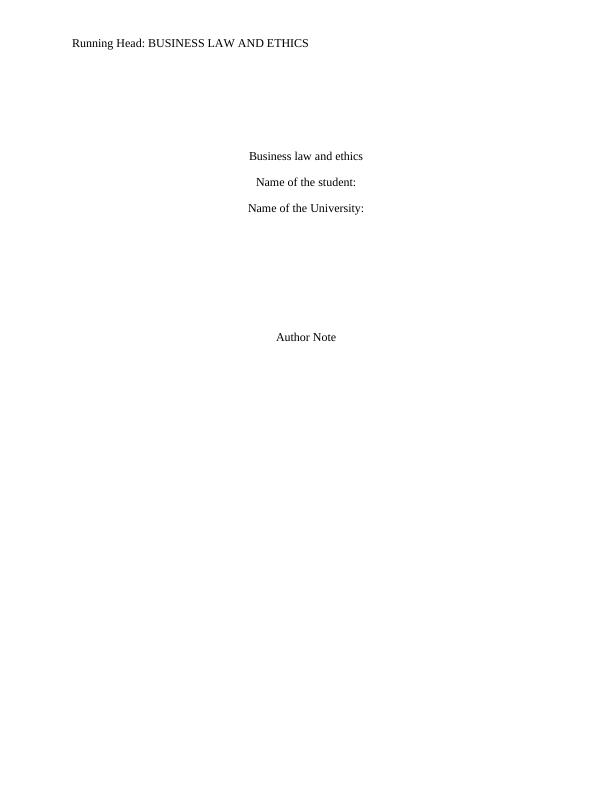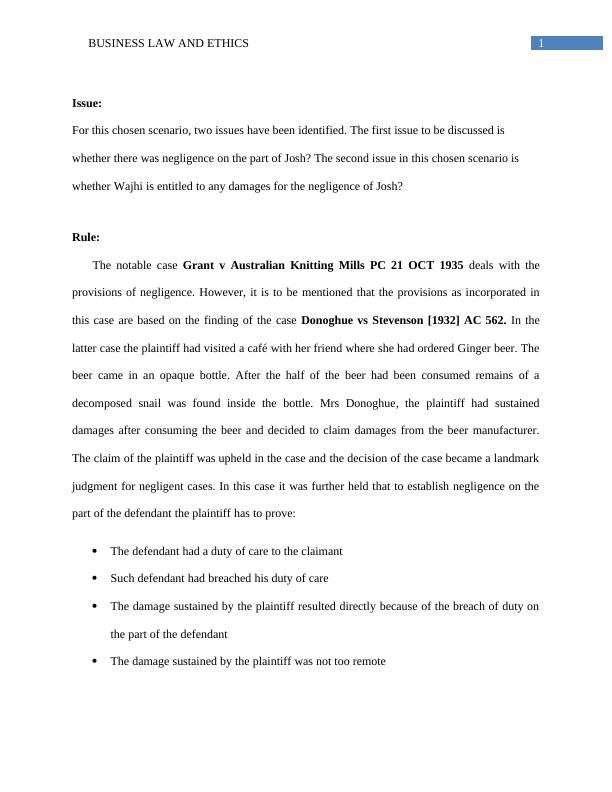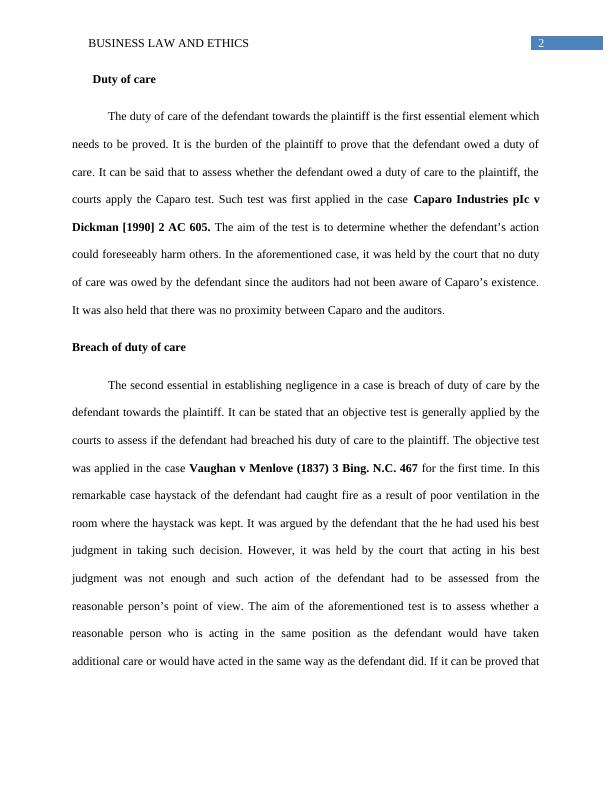Business Law and Ethics Assignment
10 Pages2107 Words88 Views
Added on 2020-05-16
Business Law and Ethics Assignment
Added on 2020-05-16
ShareRelated Documents
Running Head: BUSINESS LAW AND ETHICSBusiness law and ethics Name of the student:Name of the University:Author Note

1BUSINESS LAW AND ETHICSIssue:For this chosen scenario, two issues have been identified. The first issue to be discussed is whether there was negligence on the part of Josh? The second issue in this chosen scenario is whether Wajhi is entitled to any damages for the negligence of Josh?Rule:The notable case Grant v Australian Knitting Mills PC 21 OCT 1935 deals with theprovisions of negligence. However, it is to be mentioned that the provisions as incorporated inthis case are based on the finding of the case Donoghue vs Stevenson [1932] AC 562. In thelatter case the plaintiff had visited a café with her friend where she had ordered Ginger beer. Thebeer came in an opaque bottle. After the half of the beer had been consumed remains of adecomposed snail was found inside the bottle. Mrs Donoghue, the plaintiff had sustaineddamages after consuming the beer and decided to claim damages from the beer manufacturer.The claim of the plaintiff was upheld in the case and the decision of the case became a landmarkjudgment for negligent cases. In this case it was further held that to establish negligence on thepart of the defendant the plaintiff has to prove:The defendant had a duty of care to the claimantSuch defendant had breached his duty of careThe damage sustained by the plaintiff resulted directly because of the breach of duty onthe part of the defendantThe damage sustained by the plaintiff was not too remote

2BUSINESS LAW AND ETHICSDuty of careThe duty of care of the defendant towards the plaintiff is the first essential element whichneeds to be proved. It is the burden of the plaintiff to prove that the defendant owed a duty ofcare. It can be said that to assess whether the defendant owed a duty of care to the plaintiff, thecourts apply the Caparo test. Such test was first applied in the case Caparo Industries pIc vDickman [1990] 2 AC 605. The aim of the test is to determine whether the defendant’s actioncould foreseeably harm others. In the aforementioned case, it was held by the court that no dutyof care was owed by the defendant since the auditors had not been aware of Caparo’s existence.It was also held that there was no proximity between Caparo and the auditors.Breach of duty of careThe second essential in establishing negligence in a case is breach of duty of care by thedefendant towards the plaintiff. It can be stated that an objective test is generally applied by thecourts to assess if the defendant had breached his duty of care to the plaintiff. The objective testwas applied in the case Vaughan v Menlove (1837) 3 Bing. N.C. 467 for the first time. In thisremarkable case haystack of the defendant had caught fire as a result of poor ventilation in theroom where the haystack was kept. It was argued by the defendant that the he had used his bestjudgment in taking such decision. However, it was held by the court that acting in his bestjudgment was not enough and such action of the defendant had to be assessed from thereasonable person’s point of view. The aim of the aforementioned test is to assess whether areasonable person who is acting in the same position as the defendant would have takenadditional care or would have acted in the same way as the defendant did. If it can be proved that

End of preview
Want to access all the pages? Upload your documents or become a member.
Related Documents
Assignment on Elements of Negligencelg...
|9
|2059
|84
COMMERCIAL LAW 10 Running Head: Commercial Lawlg...
|12
|2918
|71
Commercial Law Issues - Assignmentlg...
|13
|2932
|18
Negligence and Pure Economic Loss in Construction: A Case Study Analysislg...
|10
|2398
|112
Business Law: Negligence and Ethical Decision Makinglg...
|12
|2896
|243
Assignment on Commercial Lawslg...
|6
|1395
|79
